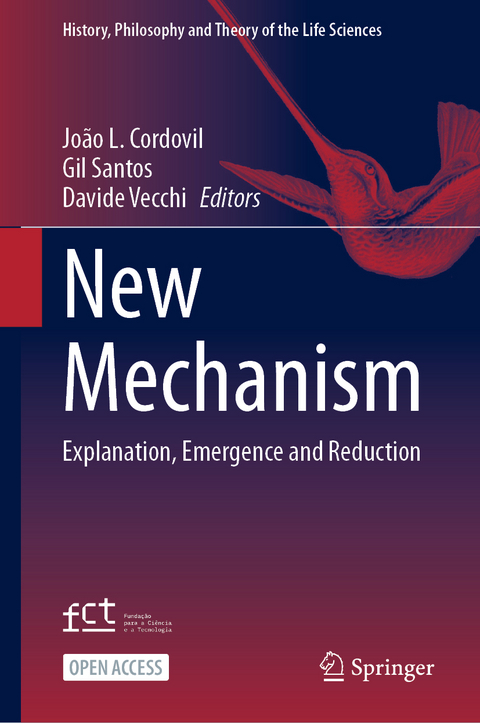
New Mechanism
Springer International Publishing (Verlag)
978-3-031-46916-9 (ISBN)
This open access book addresses the epistemological and ontological significance as well as the scope of new mechanism. In particular, this book addresses the issues of what is "new" about new mechanism, the epistemological and ontological reasons underlying the adoption of mechanistic instead of other modelling strategies as well as the possibility of mechanistic explanation to accommodate a non-trivial notion of emergence. Arguably, new mechanism has been particularly successful in making sense of scientific practice in the molecular life sciences. But what about other sciences? This book enlarges the context of analysis, addressing the issue of the putative compatibility between the current ways of conceiving new mechanism and actual scientific practices in quantum physics, chemistry, biochemistry, developmental biology and the cognitive sciences.
lt;p>João L. Cordovil is a Researcher at the Faculty of Sciences of the University of Lisbon and the Scientific Coordinator of the Center for Philosophy of Science of the University of Lisbon. His primary research fields are the Philosophy of Quantum Mechanics, Ontic Structural Realism and theory of emergence.
Gil Santos obtained his Ph.D. at the Universidade Nova de Lisboa. As an Assistant Researcher at the Faculty of Sciences of the University of Lisbon, he is currently working on his FCT research project 'Relational Emergence, Causation and Explanation'.
Davide Vecchi obtained the Ph.D. at the Department of Philosophy, Logic and Scientific Method of the London School of Economics and Political Science (United Kingdom). Davide is interested in historical, philosophical and theoretical issues in molecular biology.
Chapter 1. A framework for mapping mechanistic perspectives (João Cordovil, Gil Santos, Davide Vecchi ).- Chapter 2. Different Types of Mechanistic Explanation and Their Ontological Implications (Beate Krickel ).- Chapter 3. The Metabolic Theory of Ecology as a Mechanistic Approach (Gonçalo Martins).- Chapter 4. Causing and composing evolution: lessons from evo-devo mechanisms (Cristina Villegas).- Chapter 5. Organisms need mechanisms; Mechanisms need organisms (William Bechtel and Leonardo Bich).- Chapter 6. Searching for protein folding mechanisms: on the insoluble contrast between thermodynamic and kinetic explanatory approaches (Gabriel Vallejos and Davide Vecchi).- Chapter 7. Mechanisms in Chemistry (Robin Findlay Hendry).- Chapter 8. A commentary on Robin Hendry's views on molecular structure, emergence and chemical bonding (Eric Scerri).- Chapter 9. Fundamental Physics and (New-)Mechanistic Ontologies (João L. Cordovil).- Chapter 10. Mechanistic Explanations in Physics: History, Scope, and Limits (Brigitte Falkenburg).- Chapter 11. The Mechanisms of Emergence (Stuart Glennan).- Chapter 12. Emergence, Downward Causation and Interlevel Integrative Explanations (Gil Santos).- Index.
| Erscheinungsdatum | 14.12.2023 |
|---|---|
| Reihe/Serie | History, Philosophy and Theory of the Life Sciences |
| Zusatzinfo | XII, 272 p. 1 illus. |
| Verlagsort | Cham |
| Sprache | englisch |
| Maße | 155 x 235 mm |
| Gewicht | 583 g |
| Themenwelt | Geisteswissenschaften ► Philosophie ► Allgemeines / Lexika |
| Geisteswissenschaften ► Philosophie ► Erkenntnistheorie / Wissenschaftstheorie | |
| Informatik ► Theorie / Studium ► Künstliche Intelligenz / Robotik | |
| Naturwissenschaften | |
| Schlagworte | Evo-devo • Mechanisms in chemistry • Mechanisms of emergence • Mechanistic Explanation • Mechanistic models • New mechanism • open access • Organisms need mechanisms • Structural Realism |
| ISBN-10 | 3-031-46916-X / 303146916X |
| ISBN-13 | 978-3-031-46916-9 / 9783031469169 |
| Zustand | Neuware |
| Haben Sie eine Frage zum Produkt? |
aus dem Bereich


